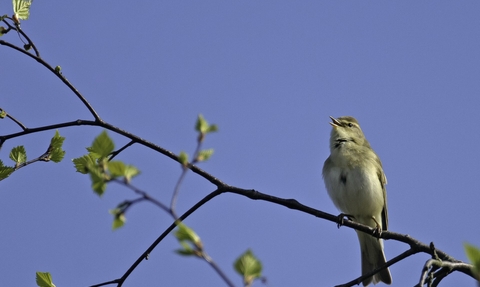
Willow warbler singing in birch tree at Frensham Common nature reserve in Surrey. April 2011. © Chris Gomersall/2020VISION
Identify warbler bird song
What bird is it?
We've got our feathered friends to thank for the beautiful soundtracks of our parks and gardens. Listen below and learn to tell apart our warbler bird species with our easy guide to warbler bird song.
Birds use song during mating season to attract mates as well as using it as a tool to defend their territories.
Willow Warbler
This warbler looks very similar to the chiffchaff, but is easily told apart by its voice. Its song is a beautiful, descending scale. Take a listen:

Blackcap
As the name suggests, the male blackcap has a black cap, while the female has a gingery one.

Cetti’s warbler
A dark, stocky warbler, the Cetti's warbler is most likely to be heard, rather than seen - listen out for its bubbling song among willow, marsh and nettles. Take a listen:

Chiffchaff
Listen to the 'chiff chaff chiff chaff' song of the appropriately named chiffchaff.

Garden warbler
A plain-looking warbler, the garden warbler is a summer visitor to the UK. It's a shy bird and is most likely to be heard, rather than seen, in woodland and scrub habitats.

Lesser whitethroat
The lesser whitethroat is smaller than its cousin, the whitethroat, and sports dark cheek feathers that give it a 'mask'. Most likely to be heard around woodland and scrub, rather than seen.

Whitethroat
The male whitethroat does, indeed, have a white throat! Arriving from Sub-Saharan Africa in April, it can be spotted on grassland and scrub, and along hedgerows. It's bigger than the lesser whitethroat.

Grasshopper warbler
This small summer migrant travels from Africa to breed in the reedbeds of the UK. Rarely seen but given away by its insect like trilling call; the movement of the head during calling makes it tricky to pinpoint the exact location of singing perch.

Reed warbler
Listen to the 'chattering' song of the reed warbler, it can usually be heard in the UK's lowland wetlands in summer.

Wood warbler
Listen out for the wood warbler singing from the canopy of oak woodlands. Green above, it has a distinctive, bright yellow throat and eyestripe.

Sedge warbler
In summer, the sedge warbler can be spotted singing from a reed or willow perch in wetlands. Males never sing the same song twice, adding new phrases to impress the females

